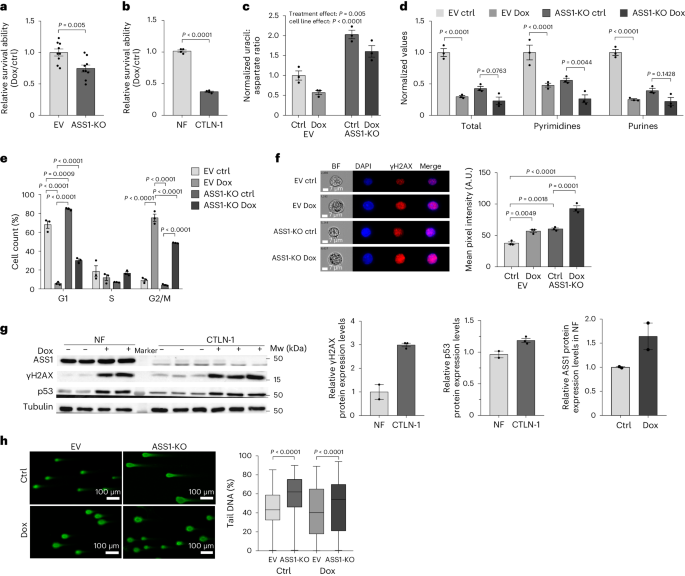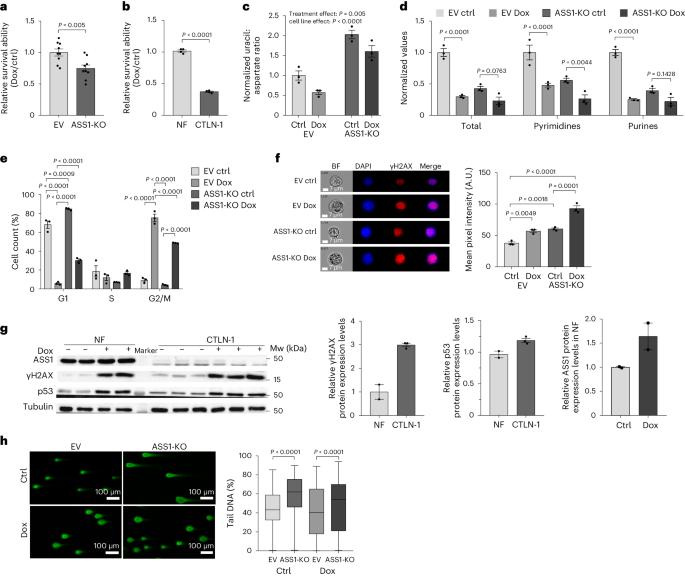ASS1 metabolically contributes to the nuclear and cytosolic p53-mediated DNA damage response
IF 18.9
1区 医学
Q1 ENDOCRINOLOGY & METABOLISM
引用次数: 0
Abstract
Downregulation of the urea cycle enzyme argininosuccinate synthase (ASS1) in multiple tumors is associated with a poor prognosis partly because of the metabolic diversion of cytosolic aspartate for pyrimidine synthesis, supporting proliferation and mutagenesis owing to nucleotide imbalance. Here, we find that prolonged loss of ASS1 promotes DNA damage in colon cancer cells and fibroblasts from subjects with citrullinemia type I. Following acute induction of DNA damage with doxorubicin, ASS1 expression is elevated in the cytosol and the nucleus with at least a partial dependency on p53; ASS1 metabolically restrains cell cycle progression in the cytosol by restricting nucleotide synthesis. In the nucleus, ASS1 and ASL generate fumarate for the succination of SMARCC1, destabilizing the chromatin-remodeling complex SMARCC1–SNF5 to decrease gene transcription, specifically in a subset of the p53-regulated cell cycle genes. Thus, following DNA damage, ASS1 is part of the p53 network that pauses cell cycle progression, enabling genome maintenance and survival. Loss of ASS1 contributes to DNA damage and promotes cell cycle progression, likely contributing to cancer mutagenesis and, hence, adaptability potential. Lim, Adler et al. show that the urea cycle enzyme ASS1 can function in the nucleus to supply fumarate necessary to drive DNA damage responses.


ASS1 对核和细胞质 p53 介导的 DNA 损伤反应有代谢贡献
多种肿瘤中尿素循环酶精氨酸琥珀酸合成酶(ASS1)的下调与不良预后有关,部分原因是细胞质天冬氨酸代谢转用于嘧啶合成,支持核苷酸失衡导致的增殖和突变。在这里,我们发现 ASS1 的长期缺失会促进来自瓜氨酸血症 I 型患者的结肠癌细胞和成纤维细胞中的 DNA 损伤。在使用多柔比星急性诱导 DNA 损伤后,ASS1 在细胞质和细胞核中的表达升高,至少部分依赖于 p53;ASS1 在细胞质中通过限制核苷酸合成来抑制细胞周期的进展。在细胞核中,ASS1 和 ASL 生成富马酸,用于 SMARCC1 的琥珀酸化,从而破坏染色质重塑复合物 SMARCC1-SNF5 的稳定性,减少基因转录,特别是 p53 调控的细胞周期基因子集。因此,DNA损伤后,ASS1是p53网络的一部分,它能暂停细胞周期的进展,使基因组得以维持和存活。ASS1 的缺失会造成 DNA 损伤并促进细胞周期的进展,很可能会导致癌症诱变,进而产生适应潜力。
本文章由计算机程序翻译,如有差异,请以英文原文为准。
求助全文
约1分钟内获得全文
求助全文
来源期刊

Nature metabolism
ENDOCRINOLOGY & METABOLISM-
CiteScore
27.50
自引率
2.40%
发文量
170
期刊介绍:
Nature Metabolism is a peer-reviewed scientific journal that covers a broad range of topics in metabolism research. It aims to advance the understanding of metabolic and homeostatic processes at a cellular and physiological level. The journal publishes research from various fields, including fundamental cell biology, basic biomedical and translational research, and integrative physiology. It focuses on how cellular metabolism affects cellular function, the physiology and homeostasis of organs and tissues, and the regulation of organismal energy homeostasis. It also investigates the molecular pathophysiology of metabolic diseases such as diabetes and obesity, as well as their treatment. Nature Metabolism follows the standards of other Nature-branded journals, with a dedicated team of professional editors, rigorous peer-review process, high standards of copy-editing and production, swift publication, and editorial independence. The journal has a high impact factor, has a certain influence in the international area, and is deeply concerned and cited by the majority of scholars.
 求助内容:
求助内容: 应助结果提醒方式:
应助结果提醒方式:


